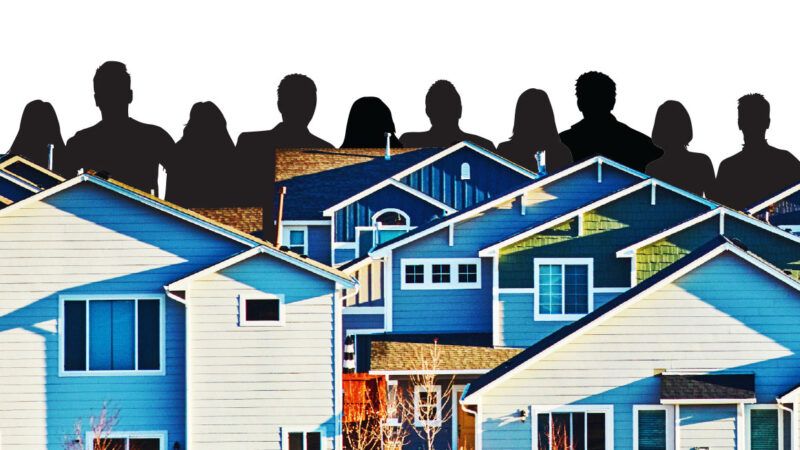Blame Regulations, Not Foreign Buyers, for High Housing Costs
Restricting foreign real estate ownership has something for both sides—conservatives don't like foreigners, and progressives don't like capital.

There's a specter supposedly haunting the globe's expensive housing markets: the absentee foreign owner. Critics claim international interlopers are buying properties that should go to hardworking native homeowners instead of rootless global elites merely looking for investment opportunities.
That's the story people are telling themselves, and it's why politicians from Wellington to Winnipeg have banned home purchases by foreigners, as the Canadian government did in January 2023. That solution misconstrues the causes of high housing prices, which are largely due to regulations that restrict the supply.
Foreign buyers accounted for just 5 percent or so of the Canadian housing market before the ban. But Liberal Party Prime Minister Justin Trudeau's government hopes that excluding them will bring down prices.
These foreigners, the government complains, are not using their homes the right way. "We will make sure that houses are being used as homes, rather than as commodities to be traded," Finance Minister Chrystia Freeland said when the ban was announced.
In 2018, New Zealand began enforcing a ban on foreign home purchases. In 2016, the Canadian province of British Columbia imposed a 15 percent tax on foreigners buying homes in the Vancouver metropolitan area. Two years later, the tax was raised to 20 percent and expanded to more areas in the province.
These policies had a dramatic impact on the nationalities of homebuyers. In New Zealand, where Singaporeans and Australians were exempt from the ban, the share of homes bought by foreigners fell from a little more than 3 percent to just 0.3 percent. In British Columbia, "foreign-involved purchases" fell from about 10 percent of all property transfers to less than 2 percent. But contrary to expectations, housing did not become substantially more affordable in either place.
One study of the British Columbia tax found that it reduced home price growth by 1 percent for roughly seven months. British Columbia is still the most expensive province in Canada to buy a home.
Annual growth in Kiwi home prices, meanwhile, remained in the double digits after the ban on most foreign buyers. Summarizing the views of several real estate economists in 2020, the New Zealand news site Stuff reported that "the ban has reduced a marginal part of the demand but has done little to solve the fundamental undersupply that has driven up prices."
We can expect similar results from Canada's nationwide ban. The issue is not that some would-be purchasers have too much money but that Canada's desirable locations have too little housing. Tamping down prices requires increasing housing stock, which requires eliminating voluminous government restrictions on new housing.
Lifting those restrictions would force politicians to stand up to voters who already own homes and want the state to protect their views, their property values, their neighborhood character, or even their national character. Politically, it's easier to punish foreigners and hope constituents don't notice that the problem persists.
That is why politicians search for scapegoats: fat-cat speculators, out-of-town gentrifiers, and local landlords who supposedly profit from keeping units empty. The absentee foreign buyer combines all these archetypes into one rich bad guy.
The cross-ideological nature of the NIMBY ("not in my backyard") coalition compounds the problem. Conservatives don't like foreigners, and progressives don't like capital, so punishing foreign capital pleases people of every political bent. In Canada, all three major national political parties supported either a ban or a tax on foreign home purchases.
Canadians priced out of desirable towns or provinces by local restrictions on housing supply are at a disadvantage when it comes to changing those rules, since they can't vote in places where they don't live. That's especially true for noncitizens, who will serve as a scapegoat until Canadians build more housing or find a new specter to blame.
Rent Free is a weekly newsletter from Christian Britschgi on urbanism and the fight for less regulation, more housing, more property rights, and more freedom in America's cities.


Show Comments (41)